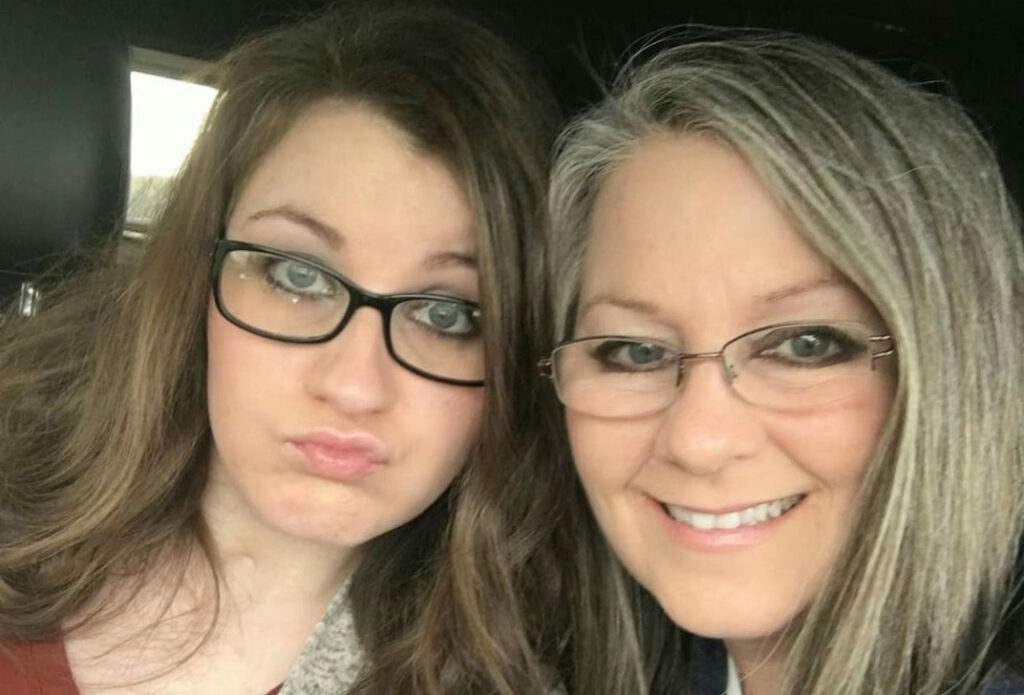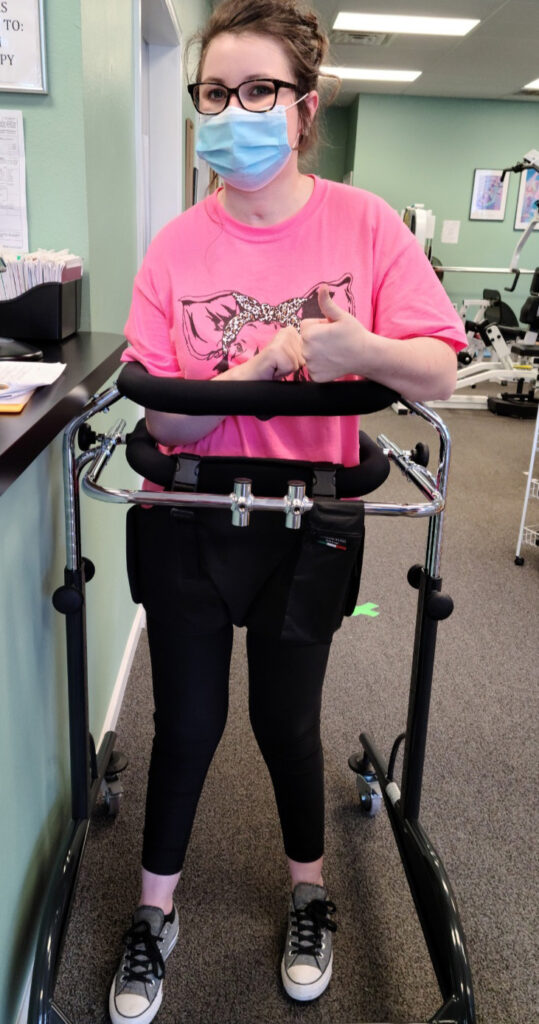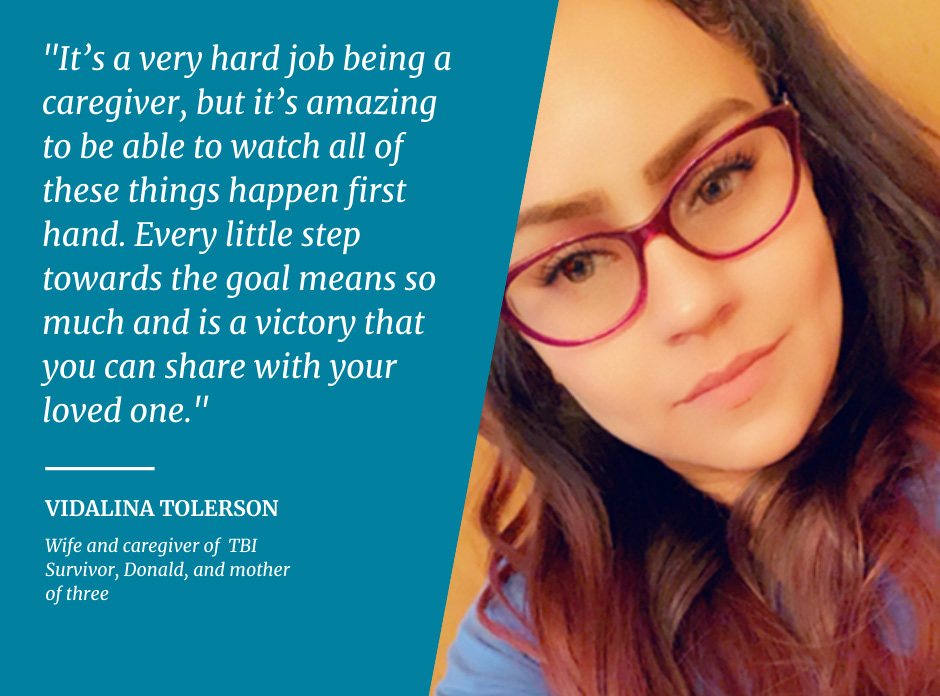Ask the Specialist: Sexuality After Brain Injury
By Ginger Nemenz RN, BSN, CBIS, CCM

Access Case Manager, Shepherd Center Atlanta Georgia
It is normal to have questions about intimacy after a brain injury. You may feel embarrassed to talk about these issues, but know that it is ok for you to talk to a doctor, nurse, therapist, or any other rehabilitation professional about it.
Fifty-eight percent of TBI survivors say that sexuality is just as important to them as before their injury, yet no one discussed this topic with them during their hospital stay. Common issues after TBI include a lack of desire, physical changes in the body, not being able to express one’s needs, and side effects of medications, just to name a few.
Suggestions for Improving Sexuality and Intimacy After TBI:
- Get a Comprehensive Medical Examination: Your doctor can check for medical problems such as hormone imbalances or side effects of medications, which can both affect your desire or ability to be sexually intimate with your partner.
- Seek Treatment: You might consider seeing a sexual therapist with your partner. For a list of certified sexual therapists in your area, ask your healthcare provider or visit the following website: http://www.aasect.org/.
If you do not feel like being sexually intimate due to depression or anxiety, you could see a therapist. The free ARConnect hotline can help
you find a mental health provider. Call 501-526-3563. - Practice communicating your intimacy needs to your partner: Practice smiling, asking your partner to tell you what their intimate needs are, participate in recreational activities you and your partner both enjoy while forming deeper connections.
- Build up your Self Esteem: Remind yourself that you are still the person you used to be, and you deserve affection and intimacy just like every other human. Look in the mirror every day, smile, and say, “I deserve love and affection and I am able to give this back in return to someone else.”
One very important reminder before you have sex is to remember to be safe. If you are a female, talk to your doctor about birth control. Consider using a condom for protection against sexually transmitted diseases. Also, you have the right to tell your partner if something they are doing makes you uncomfortable or if you do not want to do something.
For further reading about this topic, visit: https://www.biausa.org/public-affairs/media/sexual-functioning-and-satisfaction-aftertraumatic-
brain-injury-an-educational-manual
Having a brain injury doesn’t change the fact that you are a human with normal desires to be intimate and feel wanted. Don’t be afraid to talk about all of this with a healthcare provider or a loved one you feel close to.
Want to suggest a topic? Email us at braininjury@uams.edu.
A Caregiver’s Perspective: LauraLee Bardwell’s Story
As Told to Amy Moses
“We’re just going to keep on. We’re never giving up.”
Susan, Lauralee’s Mother

In May of 2015, just 3 days after graduating from high school, Lauralee Bardwell was involved in a life-altering automobile accident. She and her boyfriend were traveling back to her home in Glenwood from Hot Springs when he fell asleep at the wheel and lost control of the vehicle. The truck was wrapped around a tree, severely damaging the side where Lauralee was located. It took first responders over an hour to remove her from the truck.
Her mother, Susan, had graduated as an RN a week before Lauralee graduated from high school, and was working at CHI St. Vincent Hot Springs. She knew many of the staff in the ICU and they allowed her to see Lauralee. The ICU room would become Susan’s home over the next few weeks.
Lauralee’s diagnosis was a diffuse axonal injury (an injury where the nerve fibers in the brain tear from moving inside the skull). She had a skull fracture and some minor brain bleeds, but the outlook was hopeful. Her only other injury was a broken thumb. When the neurologist re-evaluated Lauralee, he told her mother that Lauralee would be in college by the fall of that year.
Unfortunately, after a few days Lauralee started neurostorming, meaning that she was unable to control her breathing, temperature, and heartbeat. This lasted for 7 days, but with the use of an ECMO machine they were able to regulate the vital functions of her brain. During that time, it was discovered that her colon had enlarged and was pushing her diaphragm into the chest cavity. She had an emergency surgery to remove her large intestine and had a PEG (feeding tube) inserted.
Lauralee was in the ICU at CHI St. Vincent Hot Springs for about 6 weeks and then moved to Baptist Health’s extended care unit in Little Rock for several more weeks. Lauralee continued to progress, and once she was able to participate in therapy she was moved to Baptist Health Rehabilitation Institute (BHRI).
Lauralee was unable to talk for over a year. Specialists worked with her to determine why her speech was affected, but other than atrophy, they could not find a cause. Her mother brought an iPad for her to use with the hope of providing stimulation to her brain. On Oct. 1, 2015, after five long months, Lauralee finally typed out “I know everything. I love y’all.” It was an extremely exciting and important moment for both the family and her therapists.
Lauralee was released home at the end of October. Lauralee had lost a significant amount of weight from 125 lbs down to 80 lbs. Physically, the right side of her body was the most affected by spasticity, a muscle control disorder that is characterized by tight or stiff muscles and an inability to control those muscles. Her body could not bend, and she was unable to sit upright without falling over. She continued outpatient therapy through BHRI (Baptist Health Rehabilitation Institute) throughout the following months.
Since the accident, Lauralee has had an additional surgery to remove her gallbladder, and at that time they were able to reverse the ileostomy. In fact, the first place she wanted to eat once she passed her swallow test was Taco Bell. Susan said that they should have bought stock in the company because they eat there all the time!

Last year, Lauralee spent 60 days at NeuroRestorative Timber Ridge. The time spent there helped her gain independence and gave her more confidence. While she is still unable to walk without assistance, her strength, balance, and flexibility continue to improve, and five years later she is still progressing. Lauralee was even invited by a former physical therapist to speak to one of the college classes in Mena. She was able to give her testimony and answer questions from the students. Due to COVID, they are unable to go in person this year but hope to do so again.
Their family has been blessed by an overwhelming show of support from the
community. There were fundraisers organized by their town, which gave Susan the ability to care for Lauralee during the first year after the accident. Lauralee’s mother took a job at a long-term care facility where she had previously worked, and they insisted she bring Lauralee with her to work. It was a wonderful experience for both of them, and the staff and residents soon fell in love with Lauralee. She became everyone’s “adopted granddaughter!”
As a result of her injury, Lauralee lost the ability to cry. She still has emotions, however she does not have the ability to produce tears. Recently, Lauralee was having a bad day and told her mom that she was never going to be able to walk. Susan told her, “you don’t know that!” The next thing she knew, a tear rolled down Lauralee’s face, and her mom said “Lauralee, that’s just God telling you to hold on.”
Susan said “We’re just going to keep on. We’re never giving up.” Lauralee has picked up reading again and her mom is happy to see her finding joy through books. She has encouraged Lauralee to start writing as a way to set goals and see them through. She believes that “God has a purpose and he has put Lauralee in an honored position to inspire people.” Even though there are still difficult days, they remind themselves that it’s ok to be down in the dumps, but not to stay there.
Lauralee always had big dreams and goals. In high school, she was actively involved in Future Farmers of America, and was even one of four state delegates. She got to travel around the country to represent Arkansas. Before the accident, she had planned to attend college as an agriculture major. Her dream was to help manage her Dad’s farm and possibly start an equine therapy program. The family hopes to find ways for Lauralee to be involved with the daily management of the farm and pursue her dreams.
Susan hopes their story will inspire others. “You never know who’s needing someone to walk through that door and say it’s going to get better.”
One of the most impactful statements that was shared with them during this journey was a bathtub analogy. “A brain injury recovery process is like a bathtub filling up from a slow drip. It’s a lifelong recovery.” Lauralee and her family know it is a slow process, but they are determined to provide the best support and care for Lauralee as she continues to recover.

Susan’s Tips for Caregivers:
- My advice as a caregiver would be to try and find the positive when you feel like there is none. You may be overwhelmed and it’s okay to not know which way to turn at times. When a TBI happens to a loved one or family member, it also affects everyone around them.
- I try not to take anything personal from Lauralee’s injury because it’s the brain injury, her frustration, pain, and uncertainty of her future that drives her behavior at times. Which is all part of it. Good or bad.
- Rest when you can, pray all the time, and give thanks to God for all the blessings, large or small.
Lauralee’s Tips for those Living with a TBI:
It’s hard and it hurts, but it will get better over time. Just don’t ever give up. It hurts mentally, emotionally and physically because you are dealing with so much change all at once and no one can completely understand. At times you feel alone. The days that are the hardest, just remember that a new morning will come and it will give you a chance to try again. When you get tired, learn to rest not quit.
Want to share your story? Email us at braininjury@uams.edu.
Caregiver Highlight: Vida Tolerson

Our first recognized caregiver is Vida Tolerson. Vida saw her husband Donald leave the house healthy one day in March, and the next time she saw him was three months later when he was delivered home by ambulance, in a hospital bed and completely unresponsive. He had suffered a severe TBI from a motor vehicle accident, and due to Covid-19, she was not allowed to visit him even once. Literally overnight, Vida had to learn everything there was to know about his condition and care. Over the past several months, she has served as her husband’s primary caregiver and constant advocate. She knew that he could leave this world at any time, but was determined to offer him every opportunity to improve. She is also caring for two school-aged children at home!
Donald has now improved to a state of minimal consciousness, which means he is beginning to show signs of waking up! Our nurse educator has visited their home and remarked on Donald’s excellent condition; well-nourished with healthy skin and no pressure sores. He also couldn’t help but notice Mrs. Tolerson’s positive attitude.
Vida has some encouragement to share with other caregivers who might read this message:
“It’s a very hard job being a caregiver but it’s amazing to be able to watch all of these things happen first hand. Every little step towards the goal means so much and is a victory that you can share with your loved one. Remember to celebrate everything, no matter how little it is because the little changes will add up to one big step before you know it! I know how difficult it is sometimes
to do self-care, but remember even if you take five minutes to get off your feet, that’s giving you some YOU time. Stretch, meditate, or go have a bite of food. Those are small things you can do for yourself. Napping is absolutely important! I try and take one every chance I get. Even if you don’t fall asleep, you can allow your body to recharge by just laying down.”
Social Security Pointers: Social Security in Plain Language
By Phylis Dills, Social Security Public Affairs Specialist in Little Rock
Some of the terms and acronyms people use when they talk about Social Security can be a little confusing. We’re here to help you understand all you need to know.
We strive to explain your benefits using easy-to-understand, plain language. The Plain Writing Act of 2010 requires federal agencies to communicate clearly in a way “the public can understand and use.” This can be particularly challenging when talking about complicated programs like Social Security, Supplemental Security Income, and Medicare. If there is a technical term or acronym that you don’t know, you can easily find the meaning in our online glossary at www.ssa.gov/agency/glossary.
Everyone uses shorter versions of words nowadays. We do too. Social Security’s
acronyms function as shorthand in conversations about our programs and
services.
- If you’re nearing retirement, you may want to know what PIA (primary insurance amount), FRA (full retirement age), and DRCs (delayed retirement credits) mean. These terms describe your benefit amount — based on when you decide to take it. If you take your retirement benefit at FRA, you’ll receive the full PIA (amount payable for a retired worker who starts benefits at full retirement age). So, FRA is an age and PIA is a dollar amount.
- Once you receive benefits, you get a COLA most years. A COLA is a Cost-of-Living Adjustment, and that will usually mean a little extra money in your monthly benefit.
- What about DRCs? Delayed retirement credits are the incremental (changes over time) increases added to the PIA if you delay taking retirement benefits beyond your full retirement age. If you wait to begin benefits beyond FRA — say, at age 68 or even 70 — your benefit increases.
If one of those terms or acronyms comes up in conversation, you can find the definition using our online glossary. Sometimes learning the terminology can deepen your understanding of how Social Security works for you.
Please be aware that past newsletter issues may contain outdated information. For the latest updates on resources and events, visit our website or contact us at braininjury@uams.edu with any questions.
